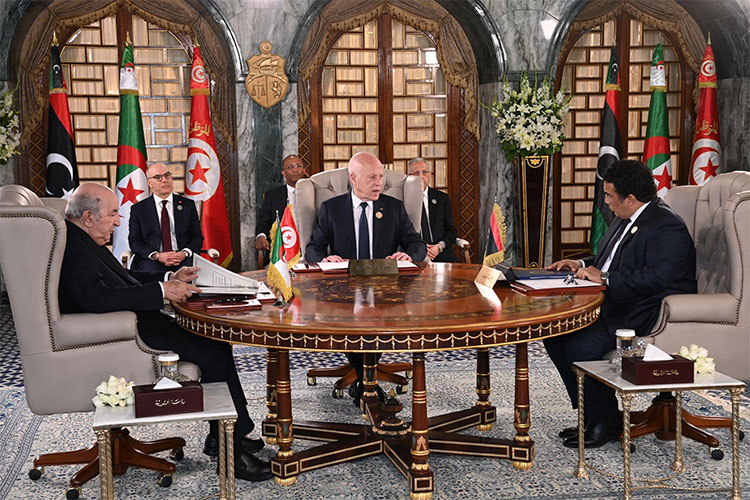Dismantling The Makhzen’s Mines to Abort Maghreb Action

A historic consultative meeting was held in Tunisia on Monday between the leaders of three Maghreb countries, namely Tunisian President Kais Saied, Algerian President Abdelmadjid Tebboune, and Mohamed Younes el-Menfi, President of the Presidential Council of Libya, to discuss several points and files of common interest.
Aside from the outcomes, the meeting is considered historic for several considerations, given the ambition it carries of building Maghreb unity and strength that the peoples of the region have long awaited after their hopes for the Arab Maghreb Union project evaporated after the internal and external forces worked hard to abort it.
The Tunis meeting takes place after 30 years of absence of coordination between the leaders of the Maghreb countries, as the last meeting dates back to 1994 in the Tunisian Al Hammamat, which hosted the Presidential Council of the Union, meaning a meeting at the summit level, attended by the leaders of the five countries. Therefore, the new meeting, even if it was consultative, sent The hope of reviving joint Maghreb action to confront the security challenges and risks that threaten the countries of the region.
Failure to hold a Maghreb summit for 30 years means wasting opportunities for coordination and joint action for a period exceeding a third of a century due to the obstacles and obstructions practised by Morocco, beginning with the request to freeze Maghreb action in December 1995 with the issuance of an instruction to the former Secretary-General of the Union, Mohamed Amamou, preventing him from participating in all the regional and international meetings, which explains the Union’s absence from the Mediterranean Conference in Barcelona in 1995, where Morocco threatened the Secretary-General to withdraw its accreditation and expel him from the Kingdom if he attended the Barcelona Conference, in addition to the Moroccan King Mohammed VI’s refusal to participate twice in the Algiers summits in 2003 and in the Lybian Tripoli in 2005, causing the cancellation of the summit.
practically, Morocco’s contribution to implementing the obligations agreed upon between the Maghreb countries remains very small compared to other countries, such as Algeria and Libya, because Morocco signed only 8 out of 37 agreements approved by the Arab Maghreb Union. However, Algeria signed 29 agreements, Tunisia signed 28 and Libya signed 27.
Algeria also committed to completing development projects registered within the Maghreb framework, such as the Maghreb highway project, where it was able to implement the project from the westernmost point to the easternmost point, in addition to the railway line linking Algeria and Tunisia.
Morocco’s “absence” again from the consultative meeting is only a continuation of the series of absences and obstructions that the Kingdom has been making since the establishment of the Maghreb bloc, which prompted the three countries to create a consultative and coordination space to confront the challenges that threaten their stability and security, especially with the widespread of terrorist movements in the Sahel region, which shares a large border strip with these countries.
The danger coming from the south does not seem to burden the Moroccan authorities since they do not have borders with the Sahel countries. Moreover, several media reports implicated the Moroccan regime in the deteriorating security conditions in some Sahel countries such as Niger and Mali, as it contributed to fueling the internal conflicts that pushed these two countries into a dark tunnel.
Furthermore, the bilateral coordination between Algeria and Tunisia, between Libya and Tunisia, and between Algeria and Libya did not stop but rather continued despite the disruption of the Maghreb Union project, countries that demonstrated, on more than one occasion, complete consistency and agreement in visions, as they shared the same approach to confronting security threats in the region. This is what the consultative meeting currently held in Tunisia aims to achieve.



